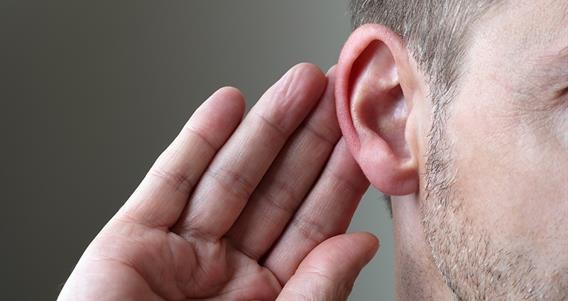Some viruses, such as measles, mumps and meningitis, can cause hearing difficulties, but what about SARS-CoV-2, the virus that causes COVID-19?
In the first few months of the pandemic, a rapid systematic review of COVID-19 and hearing difficulties revealed a possible link between COVID-19 and audio-vestibular symptoms (hearing loss, tinnitus and vertigo). However, both the quantity and quality of the early studies were low. Now that the pandemic has been with us for over a year, more studies have been published and researchers have been able to estimate how common these symptoms might be.
My colleagues and I have identified about 60 studies that report audio-vestibular problems in people with confirmed COVID-19. Our analysis of the pooled data, published in the International Journal of Audiology, reveals that 7%-15% of adults diagnosed with COVID-19 report audio-vestibular symptoms. The most common symptom is tinnitus (ringing in the ears) followed by hearing difficulties and vertigo.
Tinnitus
Tinnitus is a common condition, affecting around 17% of all adults. Most people with tinnitus also have hearing loss, suggesting a close link between the two. In fact, tinnitus is often the first warning that, for instance, exposure to loud noise or drugs that are toxic to the ear has damaged the hearing system. Interestingly, there are reports that tinnitus is a common symptom of long COVID, which is where symptoms last weeks or months after the infection has gone.
The hearing organ is clearly extremely sensitive because almost everyone will experience temporary tinnitus if they are in a very quiet environment. There are also strong links between tinnitus and stress. If people lie awake at night, stressed and anxious because of an impending deadline, financial concerns or bereavement, it is not uncommon that they will find themselves attending to noises in their ears.
This usually becomes less bothersome when the source of the stress and anxiety is removed. Surprisingly, there are no clinical tests that can diagnose tinnitus, so hearing specialists rely on self-reports.
Why tinnitus is being reported in people with confirmed COVID-19 is unclear. It is possible the virus attacks and damages the auditory system. On the other hand, the mental and emotional stress of the pandemic may be the trigger. But we need to be careful when interpreting these findings as it’s not always clear if studies are reporting existing or new symptoms. What is lacking are good-quality studies that compare tinnitus in people with and without COVID-19.
Hearing Loss and Vertigo
Hearing difficulties associated with COVID-19 have been reported across a wide age range and COVID-19 severity, ranging from mild (and managed at home) to severe (requiring hospitalisation). There are several case reports of sudden loss of hearing in one ear, often accompanied by tinnitus.
Sudden hearing loss occurs in around 20 per 100,000 people each year. It is treated with steroids to reduce swelling and inflammation in the inner ear. But the treatment only tends to work if it is started soon after the hearing loss occurs.
We know that viruses can cause sudden hearing loss, so SARS-CoV-2 may be responsible for the case reports of hearing loss in COVID patients. Yet the number of COVID-19 cases worldwide is so high that it is difficult to say with any great certainty if the cases of sudden hearing loss are higher than what we would generally expect to see each year.
Another commonly reported symptom of COVID-19 is dizziness. It can be quite difficult to differentiate this from the rotatory vertigo that is characteristic of damage to the balance system in the inner ear. However, the best estimate is that rotatory vertigo occurs in around 7% of COVID-19 cases.
Start of Our Understanding
Given the importance of providing timely evidence to inform health services, the information from this new systematic review is to be welcomed, but so far, the evidence is based on surveys and case reports. It is important not to diagnose audio-vestibular symptoms where they do not exist or where they are coincidental, given the high rates of COVID-19 in the population. However, the findings of the review might simply reflect the start of our understanding of this emergent health condition.
What is lacking are carefully conducted clinical and diagnostic studies that compare a sample of people who tested positive for COVID-19 and a sample of non-COVID controls. To that end, we are leading a year-long study to investigate the long-term effect of COVID-19 on the audio-vestibular system among people who have been previously in hospital with the virus.
ABOUT THE AUTHOR
Kevin Munro is an Ewing Professor of Audiology, Director of the Manchester Centre for Audiology and Deafness (ManCAD), Deputy Director of the NIHR Manchester Biomedical Research Centre and theme lead for Hearing Health. He is an honorary Consultant Clinical Scientist at Manchester NHS Foundation Trust. Kevin is the only audiologist to be awarded NIHR Senior Investigator status, is Principal Fellow of the British Society of Audiology, Expert Advisor for the NICE Centre for Guidelines, and a member of the Scientific Advisory Group for the Australian National Acoustic Laboratories. He is Chair of the North West Regional Advisory Committee for NIHR Research for Patient Benefit. He has held many positions within the profession, including Chair of the British Society of Audiology and Chair of the Council of the International Journal of Audiology. He is an honorary life member of the British Society of Audiology, ‘in recognition of outstanding contribution to audiology education, research and leadership’.
This article is courtesy of The Conversation.



